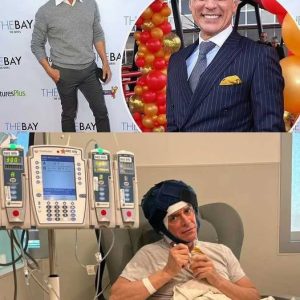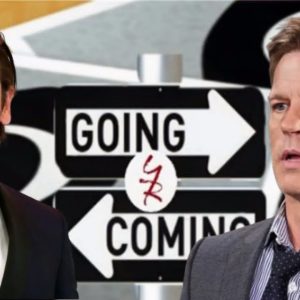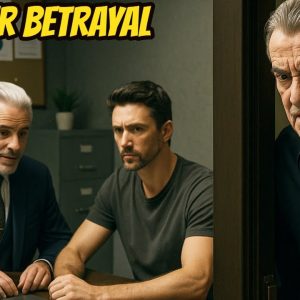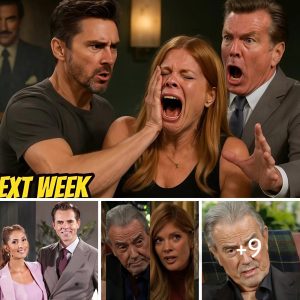In The Young and the Restless, the name Abbott has always carried weight. A symbol of legacy, loyalty, and ambition—but also of deep, festering wounds that never seem to fully heal. In a recent emotional showdown that’s left Genoa City reeling, Jack Abbott did the unthinkable: he severed ties with his brother Billy, cutting off not just business support but years of forgiveness, trust, and familial grace. And for fans of the long-running soap, the question lingers—was Jack preserving his father’s legacy, or abandoning his brother in his darkest hour?
What began as a calculated power shift turned into a full-blown civil war within the Abbott family. Jack, ever the stoic guardian of his family’s name and fortune, entrusted Billy with the keys to Abbott Communications—not out of pity, but out of belief. He believed that after years of reckless behavior, Billy had finally grown into a man capable of carrying the weight of legacy.
He was wrong.
Billy’s betrayal came swiftly and quietly, cloaked in boardroom strategies and whispered alliances. Without warning Jack, he began facilitating Cain Ashby’s bid to reclaim Chancellor Industries—a company their mother Jill had painfully let go of. Worse, he planned to hand over Abbott Communications to the unpredictable and controversial Sally Spectra, a move that would redefine the company’s identity and potentially destroy its credibility.
For Jack, this wasn’t just corporate sabotage—it was a knife to the heart. His reaction wasn’t loud or theatrical. It was quiet, cold, and final. He froze budgets, summoned emergency board meetings, and began systematically removing Billy from the business—as if he were cutting out a cancer to save the body. Sally, who once saw herself ascending to power, found her emails ignored, her proposals dismissed, and her future in limbo.
Jack had drawn the line—not out of rage, but necessity. Billy, in his eyes, had not only endangered their business but had sold out the family name in a reckless pursuit of revenge against Victor Newman. His decisions weren’t about growth or strategy. They were about ego, obsession, and a futile quest to validate himself through chaos.

And Jack had seen this movie before.
ChanceCom, Chancellor-Winters, and now Abbott Communications— all stories in Billy’s portfolio of self-sabotage. Always the same pattern: given a gift, he squanders it. Given trust, he abuses it. Given a seat at the table, he flips it over in search of something more thrilling.
But this time was different. Jack didn’t yell. He didn’t beg. He gave Billy a choice: commit to the company and rebuild trust, or walk away and lose everything—the funding, the name, the brotherly support. Jack would burn it all down to preserve what mattered most: the legacy of John Abbott.
What makes this storyline so compelling isn’t just the drama—though there’s plenty of that—but the emotional truth underneath. Jack isn’t just a CEO trying to save a corporation. He’s a brother trying, for the last time, to save someone he loves. Someone he raised, defended, forgave, and believed in—too many times. It’s a heartbreak far more raw than any corporate fallout.
And for Billy? It’s the ultimate reckoning.
Caught between his obsession with Victor and his hunger to reclaim what he believes was stolen—Chancellor, his self-worth, his identity—Billy now finds himself standing alone on the edge of everything he’s ever wanted. The cost? Jack’s trust, and possibly his future in Genoa City. Because in this town, legacies aren’t just inherited—they’re earned, tested, and sometimes destroyed.
Sally Spectra may still believe she’s the visionary Abbott Communications needs, but even she is beginning to realize the fallout is larger than expected. And Cane Ashby? His alliance with Billy may bring him back into play, but at what cost?
As the dust settles and Jack solidifies his hold on the Abbott Empire, the central tragedy becomes clear: this wasn’t about business. It was about family. And Billy, for all his bravado, finally saw what he had lost—not just a company, but the last ember of faith his brother had in him.
The Young and the Restless has always thrived on emotional stakes and power dynamics, but this arc? This is Shakespearean. It’s Cain and Abel in a boardroom. It’s about the ghosts of the past shaping the decisions of the present—and the price we pay when obsession blinds us to loyalty.
Billy Abbott once dreamed of being more than the family screw-up. But dreams die hard in Genoa City. And now, as Jack walks away, not with anger but resolve, the message is clear: trust, once broken, doesn’t get a second resurrection.





